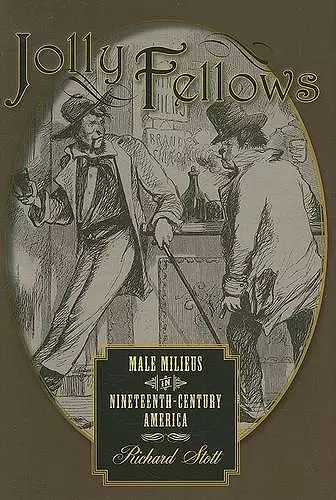Jolly Fellows
Male Milieus in Nineteenth-Century America
Format:Hardback
Publisher:Johns Hopkins University Press
Published:9th Oct '09
Currently unavailable, and unfortunately no date known when it will be back

A lively, often engaging, and sometimes appalling book about men behaving badly, an inexhaustible topic. -- Ronald Walters, Johns Hopkins University
Jolly Fellows proposes a new interpretation of nineteenth-century American culture and society and will inform future work on masculinity during this period."Jolly fellows," a term that gained currency in the nineteenth century, referred to those men whose more colorful antics included brawling, heavy drinking, gambling, and playing pranks. Reforms, especially the temperance movement, stigmatized such behavior, but pockets of jolly fellowship continued to flourish throughout the country. Richard Stott scrutinizes and analyzes this behavior to appreciate its origins and meaning. Stott finds that male behavior could be strikingly similar in diverse locales, from taverns and boardinghouses to college campuses and sporting events. He explores the permissive attitudes that thrived in such male domains as the streets of New York City, California during the gold rush, and the Pennsylvania oil fields, arguing that such places had an important influence on American society and culture. Stott recounts how the cattle and mining towns of the American West emerged as centers of resistance to Victorian propriety. It was here that unrestrained male behavior lasted the longest, before being replaced with a new convention that equated manliness with sobriety and self-control. Even as the number of jolly fellows dwindled, jolly themes flowed into American popular culture through minstrelsy, dime novels, and comic strips. Jolly Fellows proposes a new interpretation of nineteenth-century American culture and society and will inform future work on masculinity during this period.
A fascinating exploration of the relationship between a powerful cultural symbol and those who embodied it, and of the challenges involved in extracting the latter from the former. -- Elaine Frantz Parsons American Historical Review 2010 A valuable addition to the history of American masculinities. -- Brian Roberts Western Historical Quarterly 2011
ISBN: 9780801891373
Dimensions: 229mm x 152mm x 30mm
Weight: 658g
384 pages